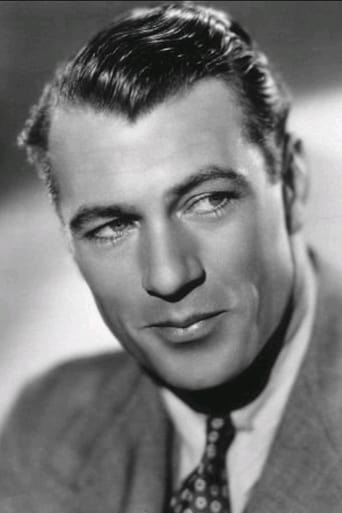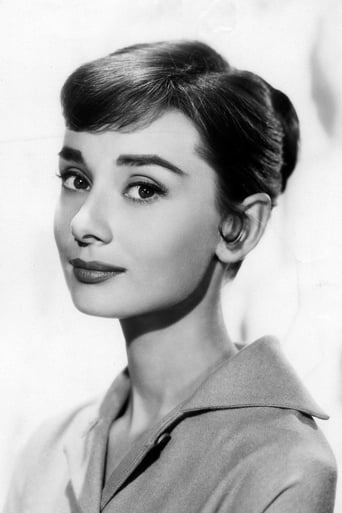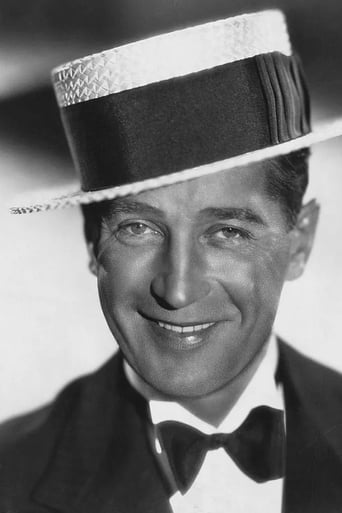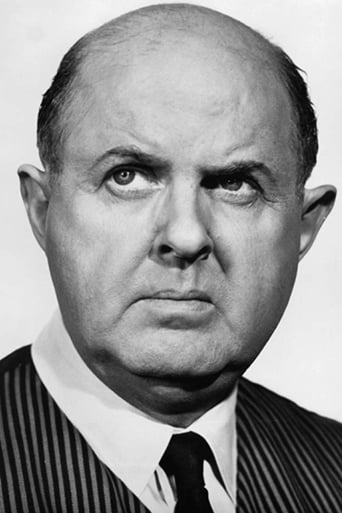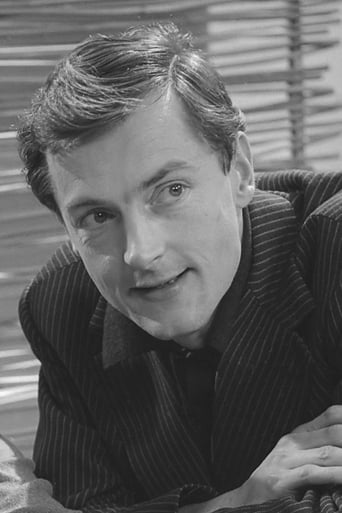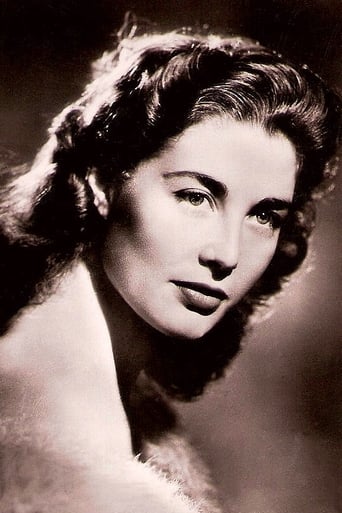ThiefHott
Too much of everything
ShangLuda
Admirable film.
Chirphymium
It's entirely possible that sending the audience out feeling lousy was intentional
Brendon Jones
It’s fine. It's literally the definition of a fine movie. You’ve seen it before, you know every beat and outcome before the characters even do. Only question is how much escapism you’re looking for.
Foawen
First things first. I remember the first time I fell in love with Gary Cooper. Of course, I had seen some of his movies before, but I was a kid back then and nothing stuck for too long. Then, when I was about 20, I started watching (and enjoying) old movies and one day they showed this rather intense western on TV (The Hanging Tree) and I was instantly mesmerized by Cooper's beauty. He was 3 years older than in Love In The Afternoon. If someone had told me back then that such a stunning man was too old for me, I would have put them in the place they deserve: a labyrinth for meddling people, who need work hard to find the concept of "consenting adults". Cooper was nothing but a gorgeous hunk during his whole career.Don't get me wrong, Hollywood does have an issue with big age differences: The issue is that their arrow of time only points in one direction. They never pair much older actresses with younger actors, even though many are still beautiful and desirable in their 40's, 50's and older. The issue is that Hepburn never got a much younger on screen love interest, in spite of being beautiful all her life. Unfortunately, it looks like this imbalance doesn't seem to have an end.However, the age difference IS the reason for this movie to exist at all, so it worked for me 100%, even if trying to guess Ariane's age was a little distracting. I mean, at first I thought she was in her late twenties, but then they put her in pigtails (Hepburn looks ridiculous, btw) and made comments pretending to make her a few years younger. However, her friend, Michel, is clearly in his thirties and the other students are even older (some look middle-aged and balding). So after a little back and forth, I settled with Hepburn's true age or a couple of years younger. It makes her characterization somewhat weird, but it can be excused by her having lived a sheltered life and having Chevalier's character for a father.Hepburn is marvelous here, of course. After all, this is the kind of role she could play in her sleep. She and Cooper are very charming and funny together and I also love their dynamic with Chevalier. The plot has been explained many times here, so I'll just say that Hepburn's character, Ariane, is not a naive girl, who falls in love with the wrong man. She knows very well who and what he is and I would say that's the exact reason why she falls for him. She might lack experience in romantic love, but that doesn't make her dumb or a victim. She devises a plan to get him to fall in love with her. In fact, she's very deceptive and manipulative for a supposedly naive girl, but it works and it doesn't come off as creepy, because Hepburn is magical like that. Cooper plays the middle-aged Don Juan millionaire, Frank Flanagan, who is well into his 50's and still going strong in the female attention department. In his mind, there is no reason to complicate his busy life with a serious relationship. He is honest about it and doesn't deceive his lovers with false promises. It is this character, who goes through the big character growth, while everyone else remains more or less static. In the first half of the film, he's the cynical hit-and-run lover, while in the second half Ariane manages to get under his skin and torment him, until he's ready to feel true love. Cooper sells simmering vulnerability like nobody else and he does this here without unnecessary histrionics. He has the ability to keep a perfect balance between drama and comedy, that feels natural and real. I believe Mr. Flanagan, when he shows that he cares deeply for this lovely young woman. That's why the second half of the film, the part showing his transformation, is my favorite and why the final scene is one of the best and most beautiful romantic endings ever.My favorite scene (other than the final one) is the one with the drink carts going to and fro between Mr. Flanagan and the gypsies, while he listens to Ariane's recording and gets drunk. It's seamlessly fantastic!Chevalier is also great, of course! As Ariane's father, he couldn't have been more perfect. Protective and loving, but never stifling. He doesn't go crazy, when he learns the truth about Ariane and Mr. Flanagan, he's just understanding and tries to do the best for his daughter, even if that means letting her go.The band of gypsies was an inspired choice to accompany Mr. Flanagan in his amorous adventures. I like to think of them as a parallel to the detective's role in Ariane's life. Both worked as crutches, that needed to be left behind, to begin a new life.
Semisonic
The cinema language is indeed a product of its times. And, just like some things weather out thousands of years barely changing and some flex and bend every now and then, so do the aspects of how movies tell their stories. The stories that remain clear and true through the decades we call classic, while some once-actual films look as if the only place they belong to today is some dusty shelf in a museum. And Love in the Afternoon seems like the latter type, no matter how I had wished it to be otherwise.I'll be honest, I quit watching this film halfway through - because of its total ugliness. No, not because it was black-and-white and with a "mere" stereo - the technical aspects hardly bothered me. It's the language the film used that was absolutely unbearable. The language of telling the love stories.Can't say it's totally this film's fault. I've seen other films from that era, for instance, My Fair Lady also featuring Audrey Hepburn. And all the films of that time are ugly when it comes to the portrayal of the interaction of two sexes. Women are always dumb as a door knob, easily falling for the most ridiculously rude men, while men are either ridiculously rude and abusive (and proud of it of course) or ridiculously weak and thoughtless. Either way, a man is always the boss while a woman is always to follow and to adapt.Yet at least My Fair Lady had a certain competition between the gender archetypes, with the woman not brilliant but at least streetwise and boisterous, and with the man conceited but also ridiculed for that. That allowed for a much more realistic composition, resulting in the story that stands relevant till the days of now. On the other hand, Love in the Afternoon looks like a classic 50's flick where women still have no right to have brains or dream of anything but some guy. What makes it even worse is that here Hepburn is just 28 and her heroine seemingly even younger, but the film postulates as her love idol a totally narcissist jackass pushing 60, and that jackass being Gary Cooper doesn't help a bit. The man is, by the film's own decree, utterly no good, yet he seems to skim all the cream off the life and what it can offer, women included.I have no idea if that abhorrent premise is to be reversed in the second act of the film. If it is, well, maybe my rating should go one or two points up. However, from what I've seen, it seemed that the only direction this film could go is to legitimize that no-good person yet again. Which might even have some outer gloss, Audrey Hepburn being cute and all, but an absolute absence of any balance between the gender roles and a total predictability of the characters turn Love in the Afternoon from a romantic flick it once was into a travesty and a caricature of the topic. Maybe this is how the guys and girls were supposed to act back then, but nowadays the only way one can view this film is as an educational material on who NOT to be and how NOT to behave. Both in the afternoon and in any other time of day.
SimonJack
For anyone who thinks "Love in the Afternoon" is a nice romance or love story, I posit the following questions to ask yourself. As a mother or father, would you want your daughter to go out with – or "fall" for Frank Flannagan, or someone like him in real life? Or, as a brother or sister, would you want your beloved sister to fall for such a man? I think Maurice Chevalier's character, Claude Chavasse, got it right. He told his daughter, Ariane (played by Audrey Hepburn) that Flannagan was a cad, despicable character – that he was no good. Flannagan, played by Gary Cooper, is an aged American millionaire playboy. He has no qualms or regrets about his many affairs with women – married or not. "Love them and leave them." That's his motto. Is that the type of man anyone would want a daughter, sister or friend to go for? I think not. Of course, we viewers know that Ariane knew about Flannagan's character (played by Gary Cooper), because she sneaked into her father's files. Yet she falls for this guy anyway. Is that romance or love? It may be romantic daydreaming or fantasizing, but love or real romance it isn't. We parents, grandparents and others who have experienced such things ourselves have known it by another term – infatuation. Ariane's father cautions his daughter, but she pursues Flannagan anyway. The demure Hepburn's character feigns a nubile persona, but we audience members can't disregard her puerile innocence, if the Flannagan character can't see through her. So, the first big problem with this film is that it is not a love story, or even a romance. It is a slice of life, of course, with some comedy. I am not averse to a story of young and old love. Some other films have handled this very well. "Battle Circus" was a 1953 film that had a young Army nurse fall for an older Army doctor during the Korean War. Humphrey Bogart (late 40s to early 50s) and June Alyson (late 20s) were very believable in their roles. On the other hand, some other films also have treated age differences quite well – as infatuation. "The Bachelor and the Bobby-Soxer" was such a film in 1947. It starred Cary Grant as a late-30s or early-40s playboy artist and professor, with Shirley Temple as the teen sister of Myrna Loy. Most reviewers have noted the huge age difference between the two leads in this film. Many found it a problem that takes away from the films' believability. And thus, its appeal. Audrey Hepburn was 28 playing an 18-year-old; Gary Cooper was 56 playing a 65-year-old – at least he looked it, for that time. And the script never tries to specify what his age is – just that he's an older playboy millionaire. Try as they do, with the old news clips of a wild Flannagan (played by Cooper), the movie makers couldn't convince this viewer – or most viewers – that Flannagan was in his 40s. As "hip" as the script tried to paint him, Flannagan definitely was not so. And that is the problem. A 35 to 45- year-old would have been an older man for a teenage girl in the 1950s. Another reviewer commented that Gary Cooper's was a grandfather character. I agree. Audrey Hepburn and her performance are the main reasons this film earns even 5 stars from me. Maurice Chevalier did very well with his role. Cooper was wooden. The idea of the film was OK and had possibilities. But it needed a younger character and actor as the playboy who could find true love and mend his ways. As it is, this script is terrible. That and the big age differences, and the casting of Gary Cooper as Flannagan made this film a dud.
J Tegeur
This is totally improbable. Today I suspect this movie would not even be made in the US. Cooper looks like he is approaching seventy and Hepburn appears as a teenager. Their relationship today would be considered totally inappropriate. The scene with the husband ready to shoot Cooper is an obvious weak attempt at comedy but comes across as bad farce and is so unbelievable you wonder how the director accepted that part of the script. From there it drags on and on waiting for the final match up with Cooper and Hepburn and the totally unrealistic outcome of marriage. Maurice and Audrey give rather good performances, Gary as usual acts like a wooden door.


